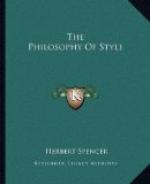7. There seem to be several causes for this exceptional superiority of certain long words. We may ascribe it partly to the fact that a voluminous, mouth-filling epithet is, by its very size, suggestive of largeness or strength; witness the immense pomposity of sesquipedalian verbiage: and when great power or intensity has to be suggested, this association of ideas aids the effect. A further cause may be that a word of several syllables admits of more emphatic articulation; and as emphatic articulation is a sign of emotion, the unusual impressiveness of the thing named is implied by it. Yet another cause is that a long word (of which the latter syllables are generally inferred as soon as the first are spoken) allows the hearer’s consciousness a longer time to dwell upon the quality predicated; and where, as in the above cases, it is to this predicated quality that the entire attention is called, an advantage results from keeping it before the mind for an appreciable time. The reasons which we have given for preferring short words evidently do not hold here. So that to make our generalization quite correct we must say, that while in certain sentences expressing strong feeling, the word which more especially implies that feeling may often with advantage be a many-syllabled or Latin one; in the immense majority of cases, each word serving but as a step to the idea embodied by the whole sentence, should, if possible, be a one-syllabled or Saxon one.
8. Once more, that frequent cause of strength in Saxon and other primitive words-their imitative character may be similarly resolved into the more general cause. Both those directly imitative, as splash, bang, whiz, roar, &c., and those analogically imitative, as rough, smooth, keen, blunt, thin, hard, crag,_ &c., have a greater or less likeness to the things symbolized; and by making on the senses impressions allied to the ideas to be called up, they save part of the effort needed to call up such ideas, and leave more attention for the ideas themselves.
9. The economy of the recipient’s mental energy, into which are thus resolvable the several causes of the strength of Saxon English, may equally be traced in the superiority of specific over generic words. That concrete terms produce more vivid impressions than abstract ones, and should, when possible, be used instead, is a thorough maxim of composition. As Dr. Campbell says, “The more general the terms are, the picture is the fainter; the more special




